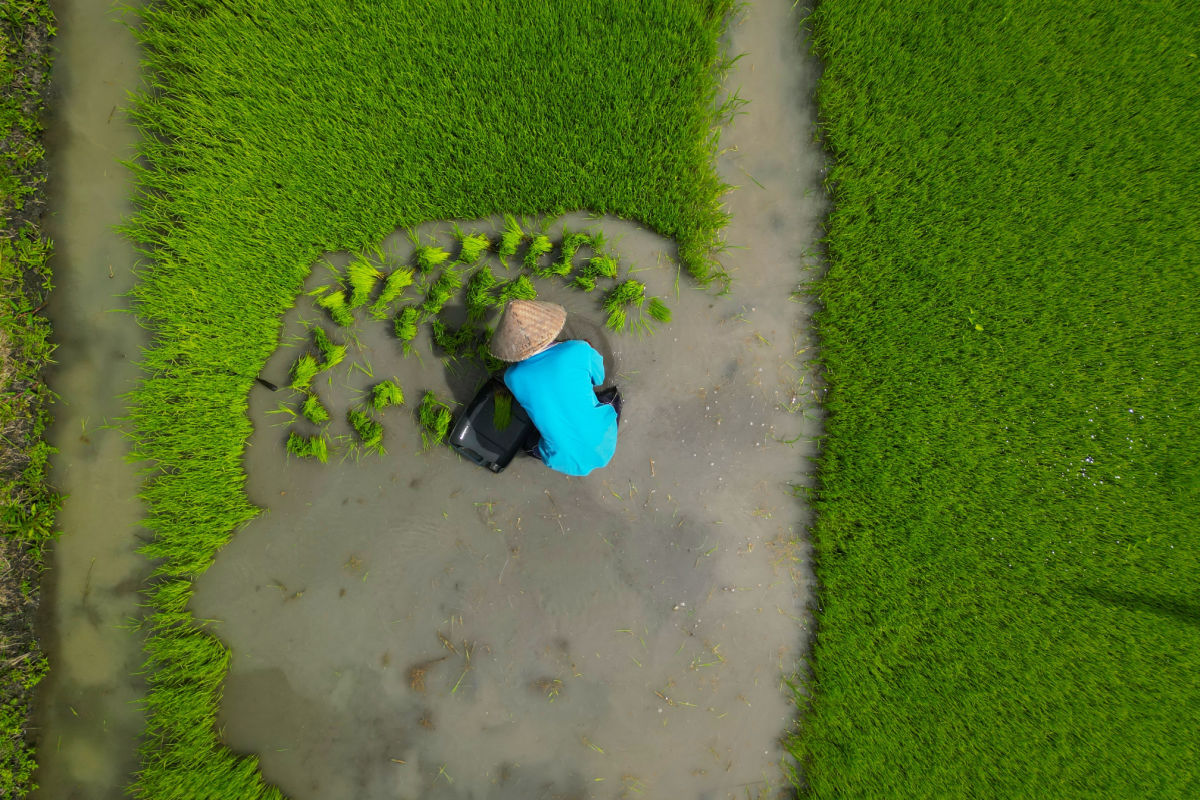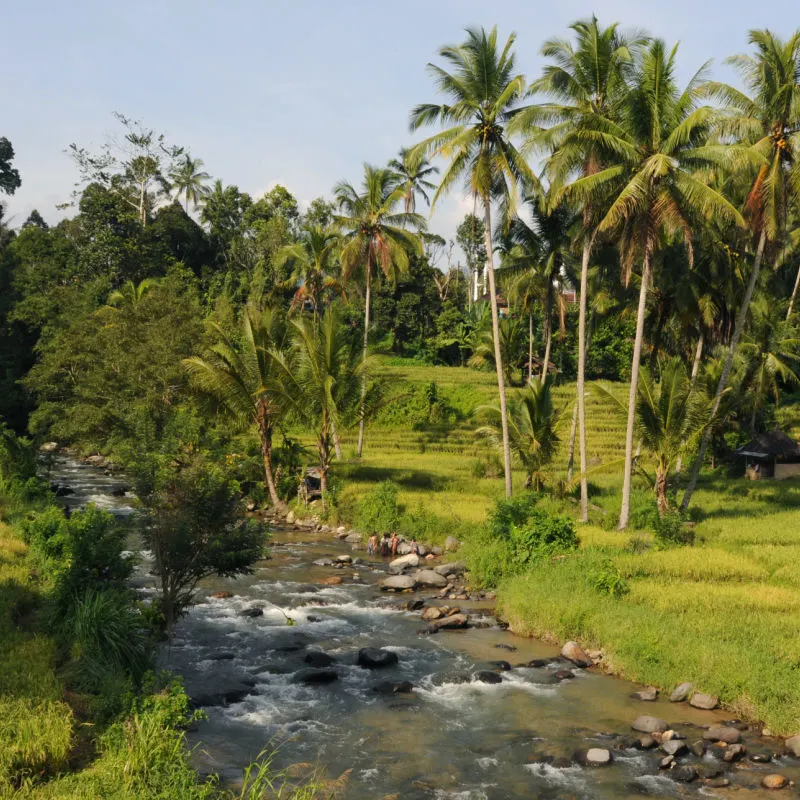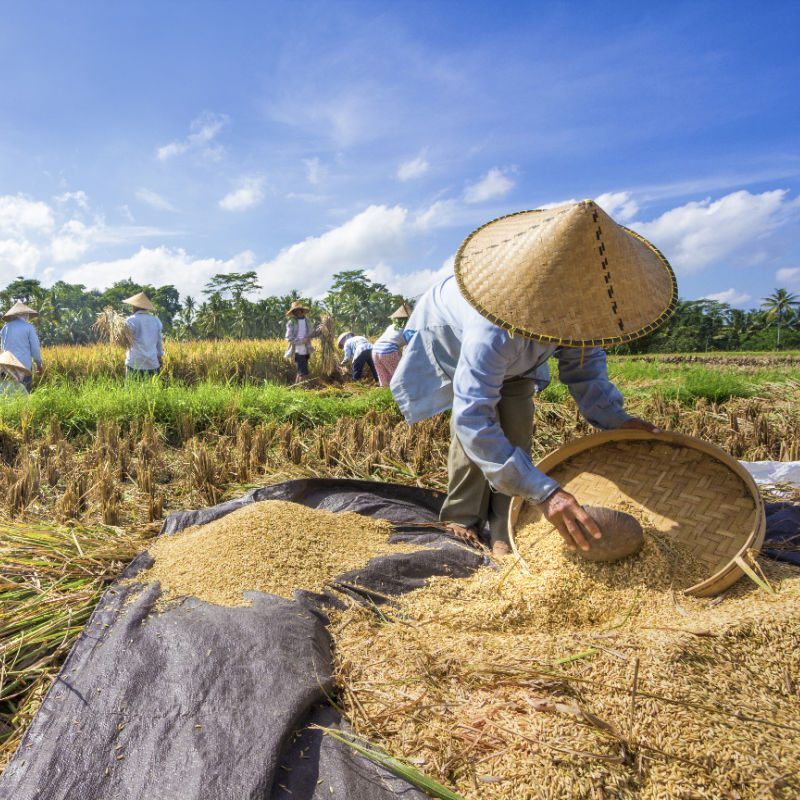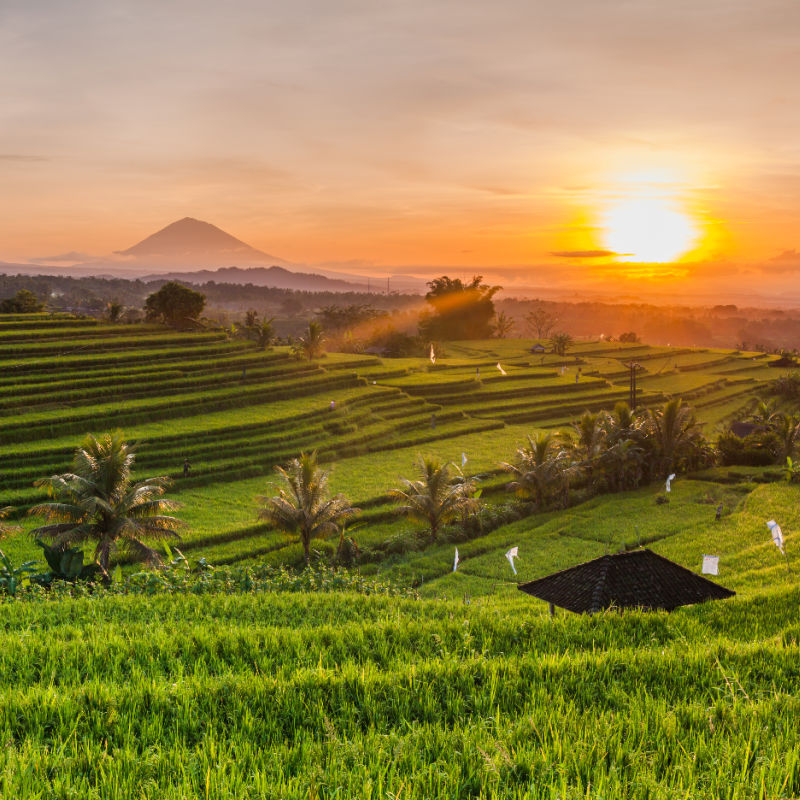As conversation in Bali continues to intensify regarding the future of tourism on the island, one group of farmers, tourism specialists, and community builders have come together to create a rice-growing revolution and demonstrate that impactful travel experiences can go above and beyond tick-box sustainability goals.

Astungkara Way is a regenerative tourism initiative and farm and agricultural movement that is changing the face of tourism on the island and encouraging Balinese farmers to revitalize traditional farming methods in new ways.
With Bali’s precious rice paddies being converted into commercial and tourism developments at an unprecedented rate, projects like Astungkara Way are proving that regenerative development brings benefits to local communities, tourists, and the land.
The Astungkara Way Hike, a 10-day hiking trail from the south Bali coast to the far north, has been open to tourists for a number of years and is seeing these limited-place guided treks sell out throughout the year.
Astungkara Way also offers a range of shorter pilgrimages and hikes that explore totally off-the-beaten path, culturally abundant, and naturally beautiful regions of Bali.
Guided by local wisdom keepers and visiting local communities along the way, the Astungkara Way Trails are proving to be one of the most engaging, insightful, and low-impact ways to explore.
Now featured by the likes of National Geographic, Astungkara Way gets the seal of approval from intrepid explorers, conservationists, environmentalists, community builders, culture enthusiasts, and more.
Astungkaraway explains, “We believe in a holistic approach to travel that goes beyond mere sightseeing. We offer transformative experiences that seamlessly blend cultural immersion, sustainable practices, and environmental stewardship.”
Our mission is to provide travelers with authentic encounters that not only enrich their lives but also leave a positive impact on the communities and ecosystems we engage with.”
The treks are typically best for those who have time for an overnight or multi-night adventure; for those who want to explore what the regenerative tourism and agriculture movement has to offer, a day or half-day trip to the permaculture farm and rice paddies is a life-changing experience.
Tourists leave not only with a greater understanding and appreciation for rice farming but also the interconnectedness of humans and the landscape.
Astungkara Way is calling for more natural farming processes to be practiced across Bali.
Once upon a time, these harmonious, integrated farming systems were the norm, but as pressure to increase yields became ever more intense, local farmers have moved towards more intensive farming methods that can have a negative impact on the environment and crop quality in the long run.

Astungkara Way explains that they are “committed to empowering the next generation of farmers by offering them the tools, training, and resources they need to build a sustainable and prosperous future.
Through our programs, young farmers are reconnecting with their cultural heritage and gaining the knowledge necessary to lead Bali into a new era of regenerative farming.”
They are now working with 200 local farmers to implement regenerative agricultural practices and are passionate about making agriculture an inclusive and community-based affair that benefits people and the planet.

Astungkara Way offers comprehensive training programs to local farmers, young and old, and offers micro-financing opportunities to help get them in the flow of growing this way.
Astungkara Way also provides a route to sustainable markets, giving farmers the assurance they need to invest further in developing their farming setup.
All the while, this approach is helping to restore and protect Bali’s ever-threatened ecosystems for the benefit of the Balinese people and all who visit these lands.
The regenerative farming methods employed by Astungkara Way and partner farmers have been proven to help regenerate soil biology and, in turn, enrich the island’s ecological abundance.

During a half day tour of the Astungkara Way farm, tourists can harvest flowers to offer at the local temple, feed the worm farm, prepare rice seedlings to be planted out in a working rice paddie, help out on the farming project of the day and enjoy a delicious and lovingly prepared freshly harvested lunch.
Remove All Ads & Unlock All Articles… Sign up for The Bali Sun Premium

Plan Your Bali Holiday:
Book The Best English Speaking Drivers For Airport Transfers & Tours
Choose From Thousands of Bali Hotels, Resorts, and Hostels with Free Cancellation On Most Properties
Book Cheap Flights To Bali
Don’t Forget Travel Insurance That Covers Medical Expenses In Bali
For the latest Bali News & Debate Join our Facebook Community
SUBSCRIBE TO NEW POSTS
Enter your email address to subscribe to The Bali Sun’s latest breaking news, straight to your inbox.

Exp
Sunday 27th of October 2024
Jatiluwih rice fields has so called UNESCO protected status.
Despite this "protected status" the local are setting up "laser shows" illuminating the rice fields with "funny faces" by laser during the evenings. Nothing is sacred anymore. All about extracting tourists for money.
LINK